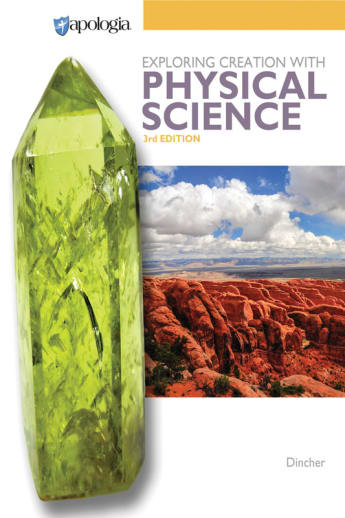Exploring Creation with Physical Science Textbook (3rd Edition)
Description
The 3rd edition of Exploring Creation with Physical Science is not only an updated version, but a greatly improved version as well. Starting with the basics of science, students are walked through the processes and branches of science through the use of updated text and images, the use of newly created infographics that breakdown difficult scientific topics, as well as rewritten and redesigned experiments.
Four modules are spent exploring the basics of chemistry, including properties and states of matter, atomic structure and the periodic table, chemical bonds, and reactions and energy. Six modules are dedicated to physics and include the study of motion, forces, energy, light, and electricity and magnetism. Students finish out their year learning about Earth science.
This 15-module, creation-based science textbook is designed to be completed in 8th grade. It is the perfect complement to the new 14-module, 7th grade, 3rd edition of Exploring Creation with General Science. It also prepares students for the 16-module high school science courses that they will be introduced to in the 9th grade.
With plenty of formal experiments to help students learn difficult concepts, students will always be engaged. New to this updated edition is the addition of extra "You Do Science" mini experiments that take concepts even further for the student.
Apologia Science courses are written from a Biblical worldview with the homeschool in mind. At the elementary level, courses follow a Charlotte Mason-inspired methodology, with lessons organized around narration, notebooking exercises and hands-on activities or projects. Children at different ages can use these together, learning at their own level. Each course is designed to be teacher-student interactive, so teacher involvement is fairly high at this level. At the junior high and high school levels, science courses are more traditional in nature, with the textbook written to the student. Teacher involvement time at this level is much less than at the elementary level. Textbooks contain student reading, lab instructions, "On Your Own" questions and Study Guide questions. A Solutions Manual provides the answers to these and the test questions. Lab kits are available separately for both the elementary and upper-level science courses which include most of the harder to find items you will need.
| Product Format: | Paperback |
|---|---|
| Grade: | 8 |
| Brand: | Apologia |
| ISBN: | 9781946506511 |
| Length in Inches: | 11 |
| Width in Inches: | 8.5 |
| Height in Inches: | 1 |
| Weight in Pounds: | 3.5 |

